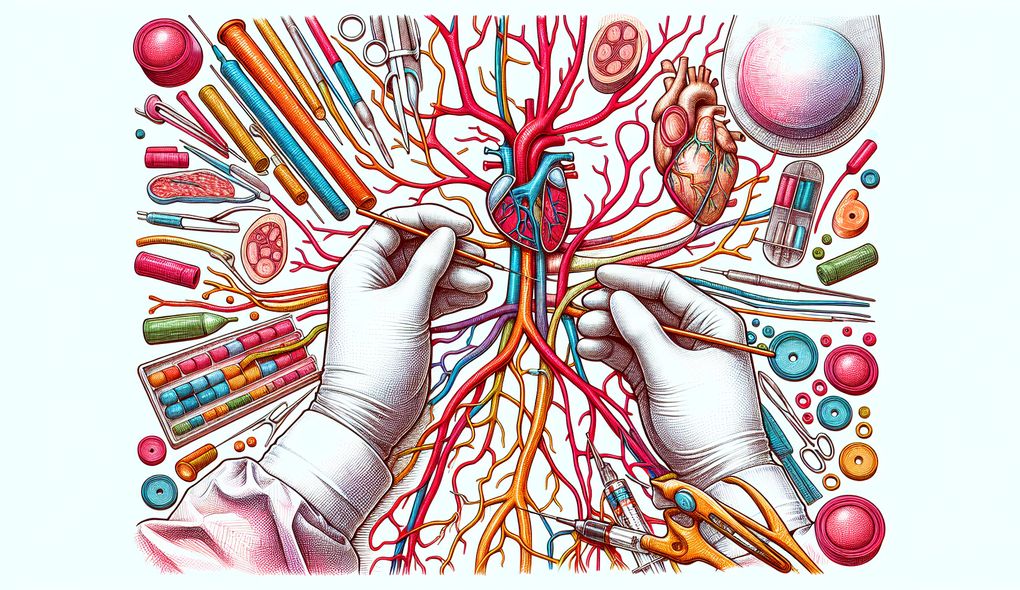Describe a situation where you faced a challenging ethical dilemma during patient care and how you resolved it.
JUNIOR LEVEL

Sample answer to the question:
During my clinical rotation in medical school, I encountered a challenging ethical dilemma during patient care. I was assigned to a patient who required a complex vascular surgery. However, during the preoperative evaluation, it was discovered that the patient had a pre-existing medical condition that significantly increased the risks of the surgery. The dilemma was whether to proceed with the surgery and potentially save the patient's life or to postpone it and avoid the potential complications. To resolve this, I gathered all the available information, including consulting with other senior surgeons and the patient's family. After extensive discussions, we collectively decided to proceed with the surgery while implementing additional precautions to minimize the risks. The patient's condition improved postoperatively, and they were able to achieve a successful recovery.
Here is a more solid answer:
During my medical school rotation, I encountered a challenging ethical dilemma while providing patient care. I was responsible for the management of a patient with a complex vascular condition who required urgent surgery. However, further evaluation revealed a pre-existing medical condition that posed a significantly higher risk for complications during the procedure. This presented a dilemma as proceeding with the surgery could potentially save the patient's life, but also had the potential for severe complications. To navigate this dilemma, I leveraged my strong foundational knowledge of vascular anatomy and pathophysiology to assess the risks involved. I engaged in discussions with senior surgeons, seeking their guidance and expertise. Additionally, I involved the patient's family in the decision-making process, ensuring their perspectives were considered. After careful consideration, we collectively decided to proceed with the surgery while implementing additional measures to mitigate the risks. These measures included extending the preoperative preparation period to optimize the patient's medical condition, involving a multidisciplinary team throughout the perioperative period, and closely monitoring the patient postoperatively. The patient experienced a successful outcome, and their condition improved postoperatively. This experience reinforced my commitment to ongoing professional education and development, as I continue to enhance my skills and knowledge in vascular surgery.
Why is this a more solid answer?
The solid answer expands upon the basic answer by incorporating more specific details and clearly demonstrating the candidate's skills and qualifications. It highlights the candidate's strong foundational knowledge of the vascular system, critical thinking abilities, and ability to work effectively in high-pressure situations. The answer also emphasizes the importance of involving the patient's family and a multidisciplinary team in the decision-making process. However, it could still benefit from providing more specific examples of the precautions taken to address the increased risks.
An example of a exceptional answer:
During my clinical rotation in medical school, I faced a challenging ethical dilemma while providing care to a patient with a complex vascular condition. The patient required urgent vascular surgery, but further evaluation revealed a pre-existing medical condition that significantly increased the risks involved. It was a critical moment where the patient's life hung in the balance, and I had to make a difficult decision. To navigate this ethical dilemma, I relied on my strong foundational knowledge of vascular anatomy, pathophysiology, and the potential complications associated with the surgical procedure. I approached senior surgeons for their invaluable insight and expertise in managing complex cases. Additionally, I involved the patient's family, ensuring open and transparent communication throughout the decision-making process. We collectively discussed the risks, benefits, and alternatives, weighing the potential outcomes and considering the patient's values and preferences. In order to minimize the risks, we implemented rigorous preoperative optimization measures to improve the patient's overall medical condition. We also assembled a multidisciplinary team, including anesthesiologists, intensivists, and nursing staff with experience in high-risk surgical cases. Continuous monitoring and frequent updates were implemented during the perioperative phase to promptly address any concerns or changes in the patient's condition. The patient successfully underwent the surgery and achieved a favorable outcome, with no major complications. This experience reinforced the importance of ongoing professional education and development to effectively handle ethical dilemmas and provide the best possible patient care.
Why is this an exceptional answer?
The exceptional answer builds upon the solid answer by providing additional details and emphasizing the candidate's exceptional skills and qualifications. The answer demonstrates the candidate's strong foundational knowledge, critical thinking abilities, and ability to effectively communicate and collaborate with senior surgeons and the patient's family. It also highlights the candidate's commitment to continuous learning and development. The answer demonstrates the thoroughness and effectiveness of the decision-making process, including the implementation of rigorous preoperative optimization measures and the involvement of a multidisciplinary team. Additionally, it highlights the successful outcome of the surgery and the patient's overall well-being. Overall, the exceptional answer provides a comprehensive and detailed response that aligns with the skills and qualities mentioned in the job description.
How to prepare for this question:
- Review ethical principles and guidelines related to patient care.
- Reflect on past experiences involving ethical dilemmas in healthcare and think about how they were resolved.
- Stay updated on the latest advancements and research in vascular surgery to enhance critical thinking and problem-solving abilities.
- Practice discussing ethical dilemmas and their resolutions in a clear, concise, and confident manner.
What are interviewers evaluating with this question?
- Strong foundational knowledge of the anatomy and pathophysiology of the vascular system.
- Excellent critical thinking and problem-solving abilities.
- Able to work effectively in high-pressure and emergency situations.
- Commitment to ongoing professional education and development.

